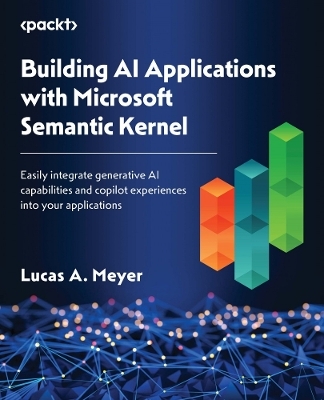
Building AI Applications with Microsoft Semantic Kernel
Packt Publishing Limited (Verlag)
978-1-83546-370-3 (ISBN)
Key Features
Link your C# and Python applications with the latest AI models from OpenAI
Combine and orchestrate different AI services such as text and image generators
Create your own AI apps with real-world use case examples that show you how to use basic generative AI, create images, process documents, use a vector database
Purchase of the print or Kindle book includes a free PDF eBook
Book DescriptionIn the fast-paced world of AI, developers are constantly seeking efficient ways to integrate AI capabilities into their apps. Microsoft Semantic Kernel simplifies this process by using the GenAI features from Microsoft and OpenAI.
Written by Lucas A. Meyer, a Principal Research Scientist in Microsoft’s AI for Good Lab, this book helps you get hands on with Semantic Kernel. It begins by introducing you to different generative AI services such as GPT-3.5 and GPT-4, demonstrating their integration with Semantic Kernel. You’ll then learn to craft prompt templates for reuse across various AI services and variables. Next, you’ll learn how to add functionality to Semantic Kernel by creating your own plugins. The second part of the book shows you how to combine multiple plugins to execute complex actions, and how to let Semantic Kernel use its own AI to solve complex problems by calling plugins, including the ones made by you. The book concludes by teaching you how to use vector databases to expand the memory of your AI services and how to help AI remember the context of earlier requests. You’ll also be guided through several real-world examples of applications, such as RAG and custom GPT agents.
By the end of this book, you'll have gained the knowledge you need to start using Semantic Kernel to add AI capabilities to your applications.What you will learn
Write reusable AI prompts and connect to different AI providers
Create new plugins that extend the capabilities of AI services
Understand how to combine multiple plugins to execute complex actions
Orchestrate multiple AI services to accomplish a task
Leverage the powerful planner to automatically create appropriate AI calls
Use vector databases as additional memory for your AI tasks
Deploy your application to ChatGPT, making it available to hundreds of millions of users
Who this book is forThis book is for beginner-level to experienced .NET or Python software developers who want to quickly incorporate the latest AI technologies into their applications, without having to learn the details of every new AI service. Product managers with some development experience will find this book helpful while creating proof-of-concept applications. This book requires working knowledge of programming basics.
Lucas A. Meyer is a Computer Scientist and Financial Economist with over two decades of experience in technology. Lucas joined Microsoft in 2002 to work with databases in Finance, joined Amazon in 2020 to work with fraud detection and prevention, and returned to Microsoft in 2022 as a Principal Research Scientist in the Microsoft's AI for Good Lab, where he works with Large Language Models (LLMs) and the Microsoft Semantic Kernel daily. Lucas' first NLP project, released in 2016, was a chatbot that streamlined several corporate finance operations and won the Adam Smith Award from London's Treasury Today. Lucas has an MBA and an M.Sc. in Finance from the University of Washington in Seattle.
Table of Contents
Introducing Microsoft Semantic Kernel
Creating Better Prompts
Extending Semantic Kernel
Performing Complex Actions by Chaining Functions
Programming with Planners
Adding Memories to Your AI Application
Real-World Use Case – Retrieval-Augmented Generation
Real-World Use Case – Making Your Application Available on ChatGPT
| Erscheinungsdatum | 19.04.2024 |
|---|---|
| Verlagsort | Birmingham |
| Sprache | englisch |
| Maße | 191 x 235 mm |
| Themenwelt | Mathematik / Informatik ► Informatik ► Programmiersprachen / -werkzeuge |
| Informatik ► Theorie / Studium ► Künstliche Intelligenz / Robotik | |
| Mathematik / Informatik ► Informatik ► Web / Internet | |
| ISBN-10 | 1-83546-370-3 / 1835463703 |
| ISBN-13 | 978-1-83546-370-3 / 9781835463703 |
| Zustand | Neuware |
| Haben Sie eine Frage zum Produkt? |
aus dem Bereich


